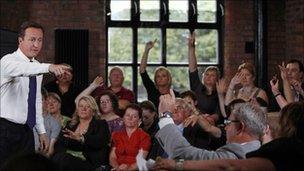Cameron takes cuts message on the road
- Published

David Cameron is trying to sell the necessity of spending cuts to the public
Major spending cuts rarely make for upbeat stories.
But David Cameron is trying to inject some optimism into a debate that has centred on how public services will cope with less money.
He has insisted there is "light at the of the tunnel", and said there is the "prize" of a successful decade awaiting the country once this process is over.
The risks he sees in not making cuts have been central to his argument for a long time. Now he wants the public to look beyond the painful years to a brighter future.
The prime minister will make that argument directly to voters at a number of events in the coming weeks, as he tries to prepare the public for more detailed announcements about cuts in the autumn.
Unsurprisingly though, many voters who rely directly or indirectly on public spending for their livelihoods are simply wondering whether they will keep or lose their jobs.
Priority
At an event in Birmingham, Mr Cameron faced questions from a fire brigade worker and the head of a local arts project.
Both wanted to know where the cuts would leave them. He could explain his strategy, but would not guarantee them funding.
Within government similar discussions are taking place.
Departments have been told to suggest how they might make cuts of between 25% and 40%. Not all ministers will deliver those plans without a fight.
Work and Pensions secretary Iain Duncan Smith has set out draft plans for welfare reform which may save money in the end but would need more funding in the short term.
Mr Cameron highlighted that work as a priority in a letter to cabinet members, and at a public event.
Those within that department may well hope, and strive, to ensure they do not suffer the same cuts as others.
Non-essential
But with health and international development spending already protected, providing funding to one department will mean another has to save more.
Some spending has already been withdrawn.
Even as the prime minister travelled from London to Birmingham, the government's marketing arm - the Central Office of Information - revealed plans to cut 287 posts.
That was a direct consequence of a freeze on non-essential advertising and marketing. There will be many similar announcements.
Mr Cameron says without pain like that Britain would be left in a worse situation, making deeper cuts in the future. Labour politicians accuse him of endangering the economic recovery.
The crucial question of the coming months will be which of those arguments convinces the public.
- Published3 August 2010
- Published2 August 2010
- Published3 August 2010